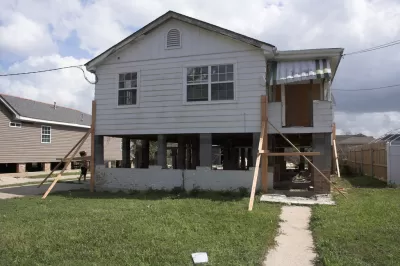After a series of hurricanes, experts discuss how guide people out of the way of the most deadly floods and storms.

"As seas rise, flooding is becoming almost a weekly occurrence in cities up and down the East Coast. As storms grow stronger, so are the calls to walk away from the most flood-prone places," Miyuki Hino, Katharine J. Mach, and Christopher B. Field write in Vox.
The problem is not that there aren't good reasons to move. "We found that moving to safer ground can be an attractive option for many reasons: It protects livelihoods, restores coastal ecosystems, and reduces damages from extreme weather," they write. But existing incentives can push people to stay.
Property taxes support localities, motivating mayors to keep populations in place or grow them. In states like Florida and Texas, which lack a state income tax, this incentive gets even stronger.
Monetary concerns can contribute to states decisions to let developers build freely. Meanwhile, when these places flood, relief efforts call heavily on federal money. "Florida alone is home to 1,601 'severe repetitive loss properties' — properties that, on average, flood every two to three years and have been rebuilt five times with the help of taxpayer money. Harris County, Texas, which includes Houston, has close to 2,000 such properties."
FULL STORY: Abandon Florida? Not quite. But it’s time for a retreat from flood zones.

Alabama: Trump Terminates Settlements for Black Communities Harmed By Raw Sewage
Trump deemed the landmark civil rights agreement “illegal DEI and environmental justice policy.”

Planetizen Federal Action Tracker
A weekly monitor of how Trump’s orders and actions are impacting planners and planning in America.

The 120 Year Old Tiny Home Villages That Sheltered San Francisco’s Earthquake Refugees
More than a century ago, San Francisco mobilized to house thousands of residents displaced by the 1906 earthquake. Could their strategy offer a model for the present?

In Both Crashes and Crime, Public Transportation is Far Safer than Driving
Contrary to popular assumptions, public transportation has far lower crash and crime rates than automobile travel. For safer communities, improve and encourage transit travel.

Report: Zoning Reforms Should Complement Nashville’s Ambitious Transit Plan
Without reform, restrictive zoning codes will limit the impact of the city’s planned transit expansion and could exclude some of the residents who depend on transit the most.

Judge Orders Release of Frozen IRA, IIJA Funding
The decision is a victory for environmental groups who charged that freezing funds for critical infrastructure and disaster response programs caused “real and irreparable harm” to communities.
Urban Design for Planners 1: Software Tools
This six-course series explores essential urban design concepts using open source software and equips planners with the tools they need to participate fully in the urban design process.
Planning for Universal Design
Learn the tools for implementing Universal Design in planning regulations.
Clanton & Associates, Inc.
Jessamine County Fiscal Court
Institute for Housing and Urban Development Studies (IHS)
City of Grandview
Harvard GSD Executive Education
Toledo-Lucas County Plan Commissions
Salt Lake City
NYU Wagner Graduate School of Public Service





























